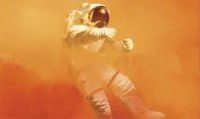 Nathan reviews The Martian by Andy Weir, Crown Publishing, 2014, 369 pages (originally self-published in 2011.)
Nathan reviews The Martian by Andy Weir, Crown Publishing, 2014, 369 pages (originally self-published in 2011.)
Space exploration, if nothing else, is dangerous. No one can demonstrate that idea quite like fictional Mark Watney of NASA’s Ares 3 mission to Mars. Watney was not only one member of a six-person crew to embark on a journey to the red planet for a thirty-day research mission, but also he was the only one who did not leave after Sol 6 (days in terms of Mars’ rotation). As the mission had to be aborted, Watney was left behind (alone in every sense) in the wake of a massive dust storm which had threatened to strand the entire team. Written primarily through mission log entries where he occasionally directly addressed the reader, we got a stream of consciousness-like look into Watney’s thoughts as he narrated much of the story. This writing style even enabled the reader to be able to see just how Watney was able to survive far beyond the planned mission end date and plus, he also had a quick wit. Sure, his background in engineering and botany came in handy, too, but his sense of humor nearly saved him just as much as his technical training.
Although the novel does not start out on good footing for the main character, things usually had a way of working out for him, even if those bright spots did not end up lasting too long. Perhaps luck and that bonus “Survived Something That Should Have Killed Me” meal further assisted our stranded spaceman. Watney’s struggles brought the reader through ups and downs, moments of despair and triumph, and even worked in a decent laugh pretty regularly. As sarcastic and difficult as Watney could be when interacting with other characters or just in his own logs, it was really hard to not cheer him on as the little and big challenges of surviving on Mars constantly worked against him. Cliffhangers–though they involve more craters than cliffs–are a common occurrence as the reader watches Watney concocted many clever solutions to combat his life-and-death problems as he raced to his goal.
Do not let the “science” part of science fiction deter you from this one. Will the seemingly endless calculations involved with space flight in general make your head spin? Worry not, for all of the calculations have been done for you. (I for one will take Watney at his word here.) Personally, aeronautics and engineering knowledge has never been my biggest strength, but, thankfully, our red planet repairman has a way of explaining even some of the most technical aspects of his work (He even changes the unit “one kilowatt-hour per sol” to one “pirate-ninja” because, why not? He is the unofficial king of Mars). Furthermore, the scientific aspects of the novel help to foster a better appreciation for the setting and plot as well as the day-to-day challenges one would face when trying to escape Mars before time (and food) run out.
In the end, rescuing Watney became the unifying cause for the Ares 3 team, NASA, and nearly the whole planet (Earth, that is).






